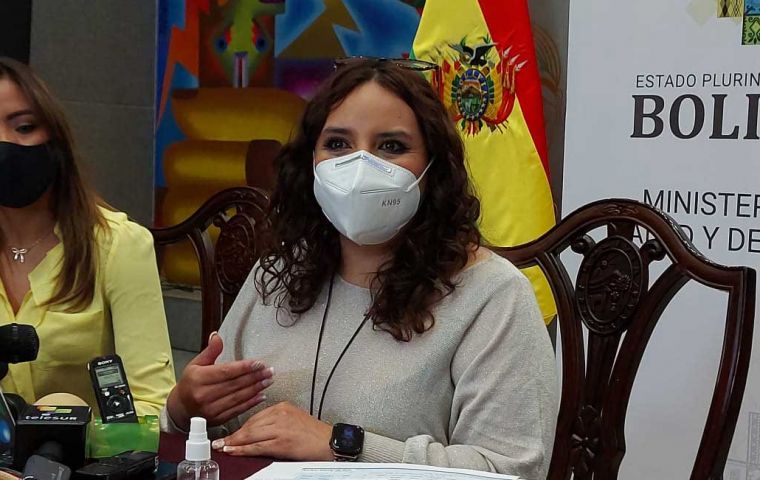MercoPress. South Atlantic News Agency
Bolivia declares epidemiological alert as number of Covid-19 grows
 The system must remain attentive, Minister Castro said
The system must remain attentive, Minister Castro said Bolivian authorities Wednesday decreed an epidemiological alert in the face of an increasing number of cases of Covid-19. “It is not the first alert that it is launched,” Health Minister María Renée Castro explained. “When we have some diseases that begin to circulate we launch an alert to tell the system that it must remain attentive, so that we are all there, with all the protocols,” she added.
This week, an in infections was reported in La Paz (from 51 to 122 cases), Santa Cruz (from 69 to 138), and Cochabamba (from 303 to 523) while three fatalities were registered in the last two weeks - a 14-month toddler, a 68-year-old woman with underlying diseases, and a 52-year-old man, all of them in Santa Cruz.
Castro insisted on the importance of biosecurity measures and vaccination for people aged 12 years old and over who might be eligible for a booster 12 months after the last application, in addition to at-risk groups plus people over 60 years of age with or without an underlying condition, as well as healthcare personnel and pregnant women.
On July 31, Bolivia lifted the coronavirus pandemic health emergency and enacted a state of epidemiological alert.
In Cochabamba, health authorities warned of increasing circulation of the JN.1 strain of the SARS-CoV virus, also known as Pirola, of which a 73% growth (523 new cases) was detected, according to local Chief Epidemiologist Rubén Castillo.
The JN.1 subvariant is said to be the fastest-growing strain of the virus.
Meanwhile, Uruguayan authorities announced a campaign to apply a booster dose of the Covid-19 vaccine to people in nursing homes for both residents and healthcare personnel at least six months after the previous injection.
Very low adherence to this new booster was reported in Montevideo after relatives of people living in these facilities were sent the forms to authorize the injection.
In the Brazilian state of Pernambuco, 2,468 cases were registered in just one week. Gatherings ahead of the year-end holidays are believed to have multiplied the spread of the malady between Dec. 17 and 23. Of these cases, 38 were serious and one person has died, according to the State's Health Department.
Since epidemiological week 44, between Oct. 29 and Nov. 4 when 89 infections were confirmed, Pernambuco has been recording an increase in Covid-19 cases.
The Dec. 22 InfoGripe bulletin released by the Oswaldo Cruz Foundation (Fiocruz) highlights the continued increase in the number of new cases of Severe Acute Respiratory Syndrome (SARS) associated with Covid-19 in several states in Brazil's Northeast Region, including Alagoas, Ceará, Paraíba, Pernambuco, and Sergipe.




Top Comments
Disclaimer & comment rulesCommenting for this story is now closed.
If you have a Facebook account, become a fan and comment on our Facebook Page!